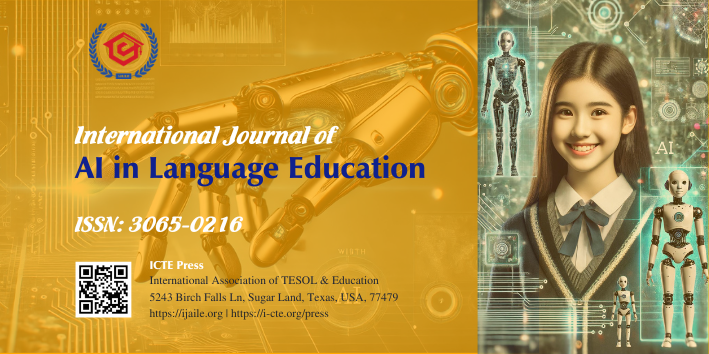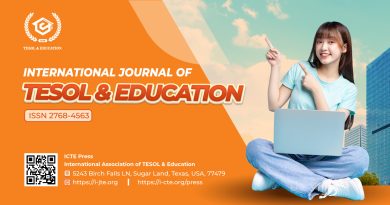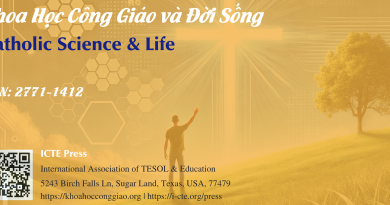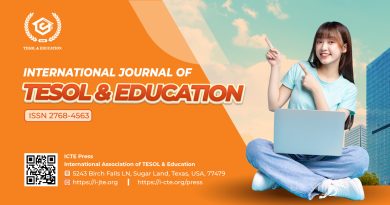AI in Language Education: Vol. 2 No. 1 (2025)
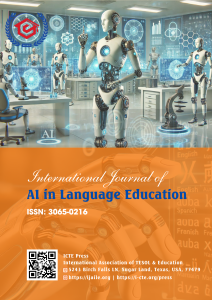 Dear beloved language educators,
Dear beloved language educators,
The editorial board of the International Journal of AI in Language Education (IJAILE) is pleased to report the Volume 2, Number 1 (2025) successful publishing. This problem makes a major contribution to the expanding field of artificial intelligence in research, education, and language acquisition.
In this issue, Nguyen et al. (2025) conducted a study on the perceptions of interpretation skills and CALL among fourth-year English undergraduates at Hanoi Open University. The study discovered that students appreciated CALL for enhancing their motivation, concentration, learner autonomy, and interpretation skills, as evidenced by questionnaires completed by 194 students and interviews with three lecturers. Nevertheless, they encountered obstacles such as a fear of making errors, a limited vocabulary, and a lack of cultural knowledge.
Nguyen et al. (2025) investigated the obstacles that postgraduate English majors at IUH encounter when employing ChatGPT in academic writing. The study discovered that ChatGPT promotes idea generation and saves time, but it also raises concerns about accuracy, plagiarism, and reduced critical thinking, resulting in overreliance and academic skill deterioration. This was achieved through the use of a qualitative survey and brief interviews with 25 students.
Pham (2025) did a literature review to investigate the use of ChatGPT as a learning tool for EFL students’ writing skills. Based on social constructivism, the study combined global and Vietnamese research. The findings revealed that ChatGPT increased engagement, tailored learning, and writing development while raising issues about disinformation, overreliance, and privacy, emphasizing the need for ethical and directed use.
With a sequential mixed-methods approach, Dinh (2025) looked at elements influencing ICT integration among EFL professors at a Vietnamese university. Seven of the eighty-one teachers who answered questions went to interviews. While financial support and student past experience had the least effect on ICT use, results revealed that teachers’ opinions in ICT advantages, their skills, and students’s motivation were the largest influencers.
Tran, Le, and Tran (2025) investigated the advantages and disadvantages of AI technologies in academic writing with 30 MA English students at IUH. They collected data using a mix of surveys and interviews. The findings found that while AI technologies enhanced grammar, idea generation, and confidence, they also highlighted issues about cost, overreliance, bogus references, and access to premium services.
Truong, Le, and Nguyen (2025) evaluated how English-major master’s students at IUH perceived the use of ChatGPT for research writing. Using a mixed-methods approach with surveys and interviews with 29 students, the study discovered that students valued ChatGPT’s assistance with concept structure and writing, but were concerned about disinformation, overreliance, and plagiarism threats, highlighting the importance of supervised ethical use.
We would want to sincerely thank you to all the authors of the excellent and perceptive study papers. The caliber, variety, and intellectual rigor of this issue have been much enhanced by your research work and dedication.
We also really appreciate our reviewers, who committed their time, knowledge, and careful attention to make sure every submission was closely examined. The success of this volume has been much aided by your careful comments and dedication to upholding high standards.
We also really appreciate the editorial staff’s relentless effort in managing the general publishing process, editing, formatting, and review coordination. Your behind-the-scenes work guarantees flawless operation and professional presentation of every problem.
The International Journal of AI in Language Education kindly invites authors for our forthcoming Volume 2, Number 2 (2025). Original research papers, case studies, and review papers on the uses of artificial intelligence in language education—including but not limited to AI-assisted learning, automated feedback, AI-enhanced assessment, and ethical concerns in AI use—are welcome here.
Thanks be to God for everything!
Warm regards!
Associate professor Dr. Pham Vu Phi Ho
Editor-in-Chief
International Journal of AI in Language Education (IJAILE)

